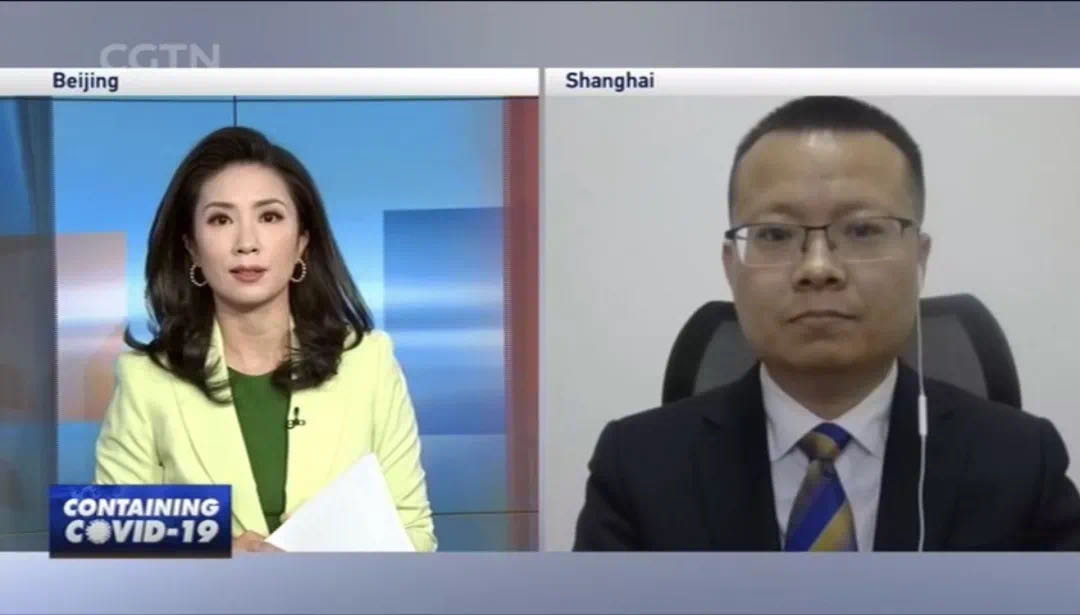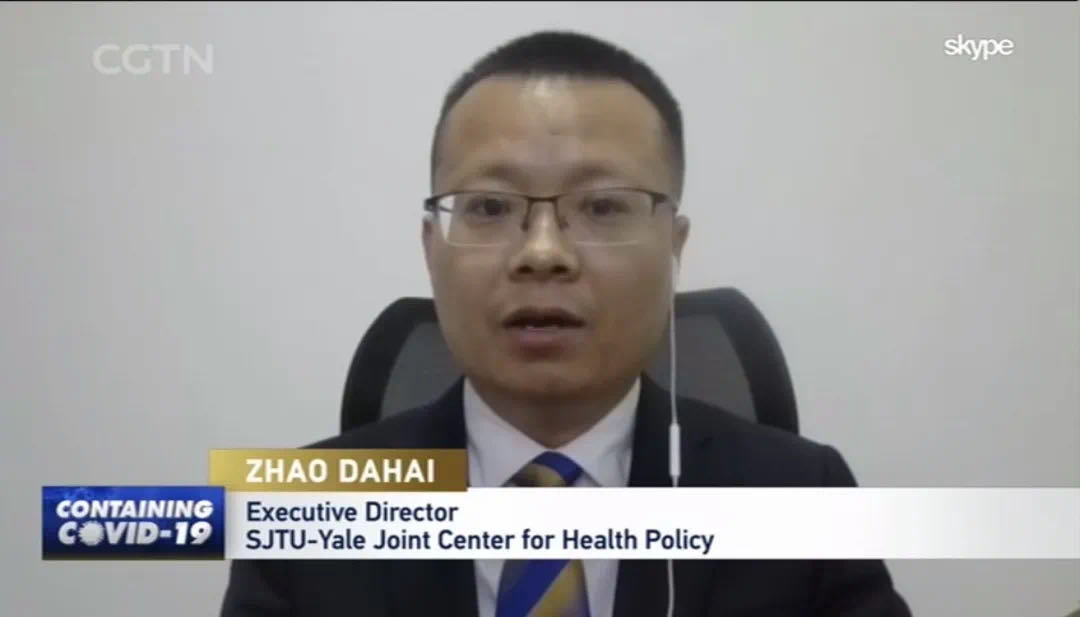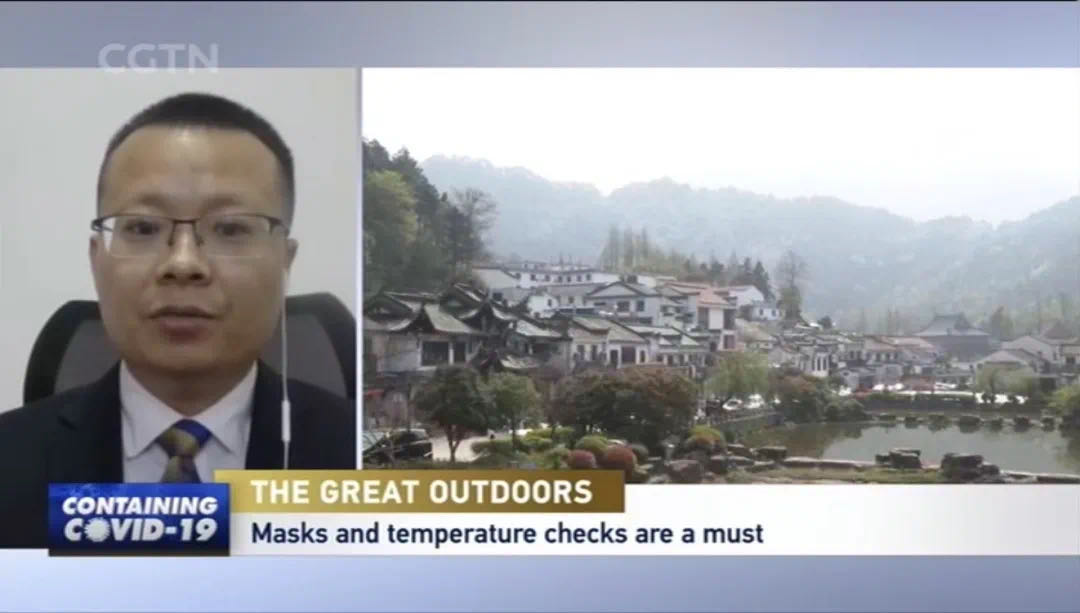上海交大赵大海关于新冠疫情第20次在电视台访谈评论:假期旅游应谨慎,严防疫情反弹

上海交通大学国际与公共事务学院博士生导师、上海交通大学-耶鲁大学卫生政策联合研究中心执行主任赵大海,自新冠肺炎疫情以来第十三次接受中央电视台直播采访,也是第二十次接受央视/上视直播采访。在2020年4月7日晚8点的中央电视台英语频道CGTN《中国24小时》节目,赵大海就假期旅游对新冠肺炎疫情防控的影响及进一步的防控措施等进行了评论。现将主要内容翻译并摘录如下。

主持人:疫情暴发以来,一些防范措施已经到位,例如戴口罩和量体温。然而,您认为需要加强提高公共卫生意识的政策和措施还缺少什么?
赵大海:首先,地方政府尽可能不要鼓励市民去旅游和去公园等公共场所。我知道很多地方政府都鼓励人们去游览风景区,以恢复经济增长。例如,在清明节,大量的游客聚集在公园或一些景点。在公园或景区,游客很难保持适当的距离。其次,政府尽可能号召居民不要参加聚会。如果朋友们一起吃饭,他们不可能戴口罩,也很难保持适当的距离。考虑到新冠肺炎疫情在中国仍然处于高风险状态,我认为如何说服居民减少旅行和不参加聚会是近期加强公众健康意识最重要的措施。特别是在五一劳动节期间更需要高度警惕。
主持人:与此同时,由于长时间待在家里,许多人认为会产生"报复性旅游",政策制定者可以采取哪些措施来缓解户外景点的压力?
赵大海:这是一个很好的问题。政策制定者应该告诉人们不要盲目去户外景点。虽然地方政府希望通过旅游业来恢复经济,但抗击新冠肺炎疫情在许多地方仍是一项艰巨的工作。因此,如果地方政府不想阻止人们出行,至少不能采取措施鼓励人们出行。现在不是放松警惕的时候。否则,得不偿失。旅游景点管理部门也应该为所谓的"报复性旅游"做好准备。我认为旅游景点可以分为两类来进行不同的准备。第一类是收费的景区,如黄山、泰山等:这些景区必须限制每天的游客人数;简化进入程序,避免在入口处拥挤;此外,所有访客都应在线预订。第二类是免费景区,如上海外滩、杭州西湖等:地方政府应该招聘足够的临时工作人员来确保每天游客的数量限制和距离保持。
供稿单位:国务学院
日期:2020年4月8日
Dahai Zhao' 20th comments on TV during the Pandemic: Precautionary Measures on Tourism, Stringently Preventing Epidemic from Rebounding
Dahai Zhao, a doctoral supervisor at School of International and Public Affairs of Shanghai Jiao Tong University and Executive Director of Shanghai Jiao Tong University-Yale University Joint Research Center for Health Policy, has been interviewed by CGTV for the 13th time (the 20th time by CGTV / DFTV totally) since the COVID-19 pandemic. At 20:15 on April 7, 2020, Zhao commented on stringent measures preventing epidemic from rebounding on CHINA 24.
Anchor: Well, we've seen some prerequisites are putting in place since the outbreak starts, such as wearing masks and temperature checks. But there are chances of increased risks when you let your guard down. So what is missing now in policies and measures to raise public health awareness?
Zhao: First, local governments cannot encourage people to travel and to go to public areas such as parks. I know lots of local governments have encouraged people to visit scenic spot in order to improve the economy. For example, on Ching-Ming festival, a large amount of visitors gathered in parks or some scenic spots. In addition, at parks or scenic spots, it is very difficult for visitors to keep proper distances. Second, governments persuade people not to attend gatherings. If friends have lunch or dinner together, it is impossible for them to wear face masks and keep proper distances. Considering the situation of COVID-19 is still at high risk in China, I believe how to persuade people not to travel or not to attend gatherings is the most important to reinforce to raise the public health awareness in the near future, particularly on Labor Day from May 1st to 5th.
Anchor: Now, many are warning about the so called retaliatory tourism. This is understandable. People have been cooped up for so long and that there could be a tourism explosion. What can policymakers do to ease the pressure on outdoor sports?
Zhao: This is a great question. Policymakers should tell people not to go to the outdoor spots blindly. Although local governments hope to recover economy through tourism, combating COVID-19 is still a tough job in many places. Therefore, if local governments do not want to block people’s traveling, local governments at least can not take measures to encourage people to travel. It is not time to relax vigilance. Or else, gains cannot make up for losses. The outdoor spots management departments should also prepare for the so called "retaliatory tourism.I think the outdoor spots can be classified into two types. The first one is Scenic spot for admission. Such as, Huangshan, Taishan, etc. These scenic spots must limit the daily number of visitors. To simplify entry procedures escapes the crowding at the entrances. In addition, all visitors should reserve online. The second one is free scenic spot. Such as Shanghai bund, Hangzhou West lake, etc. The city government should recruit enough temporary staff to make sure the limit of daily number of visitors and keep distances.
Contributor: SIPA, SJTU
Data: April 8, 2020

